Are you ready to transform your outdoor space into a captivating oasis? In a world where innovation meets nature, landscape design has evolved into an art form that balances functionality, sustainability, and aesthetics. In this listicle, we present “” that will elevate your garden, backyard, or urban environment into a stunning retreat. Whether you’re a seasoned gardener or just starting your journey into outdoor design, you can expect to uncover fresh concepts, practical tips, and inspiring visuals that will ignite your creativity. From water-efficient plant arrangements to cutting-edge hardscaping techniques, each idea is thoughtfully curated to help you envision your dream landscape and make it a reality. Dive in and discover the possibilities that await you in the realm of modern landscape design!
Vertical gardens create stunning green walls, enhancing modern landscape design with vertical elements
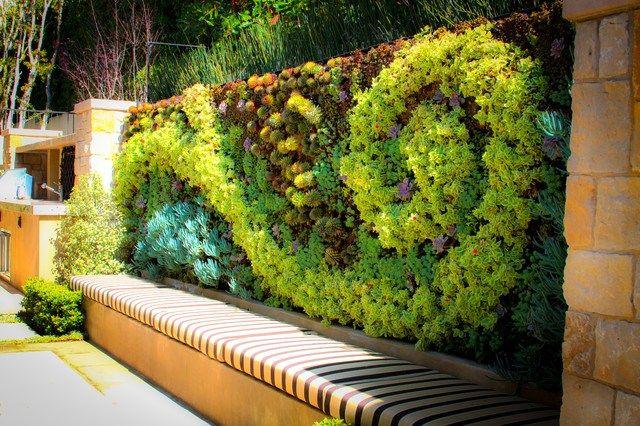
In the heart of bustling urban environments, vertical gardens emerge as a breathtaking fusion of nature and architecture. These stunning green walls not only serve as aesthetic enhancements but also help to purify the air and create a micro-ecosystem right in the midst of city life. By utilizing various types of plants, ranging from succulents to flowering vines, homeowners and landscape designers are reinventing outdoor and indoor spaces, giving rise to innovative vertical elements that transform plain surfaces into vibrant displays of life. Consider incorporating trellises and modular planters that allow for easy customization and maintenance, making it simple to swap out plants seasonally for continuous visual interest.
Moreover, integrating vertical gardens into modern landscape design offers unique opportunities for creativity and sustainability. Whether used to create dramatic backdrops, define space, or enhance privacy, these greenery-laden walls provide both functional and decorative benefits. The use of smart irrigation systems facilitates water conservation, making them an eco-friendly choice. With the trend for urban gardening on the rise, enthusiasts can explore resources for design inspiration and more at Houzz, where they can find numerous projects showcasing the beauty and versatility of vertical greenery in modern landscapes.
Incorporate smart irrigation systems to promote efficiency in modern landscape design
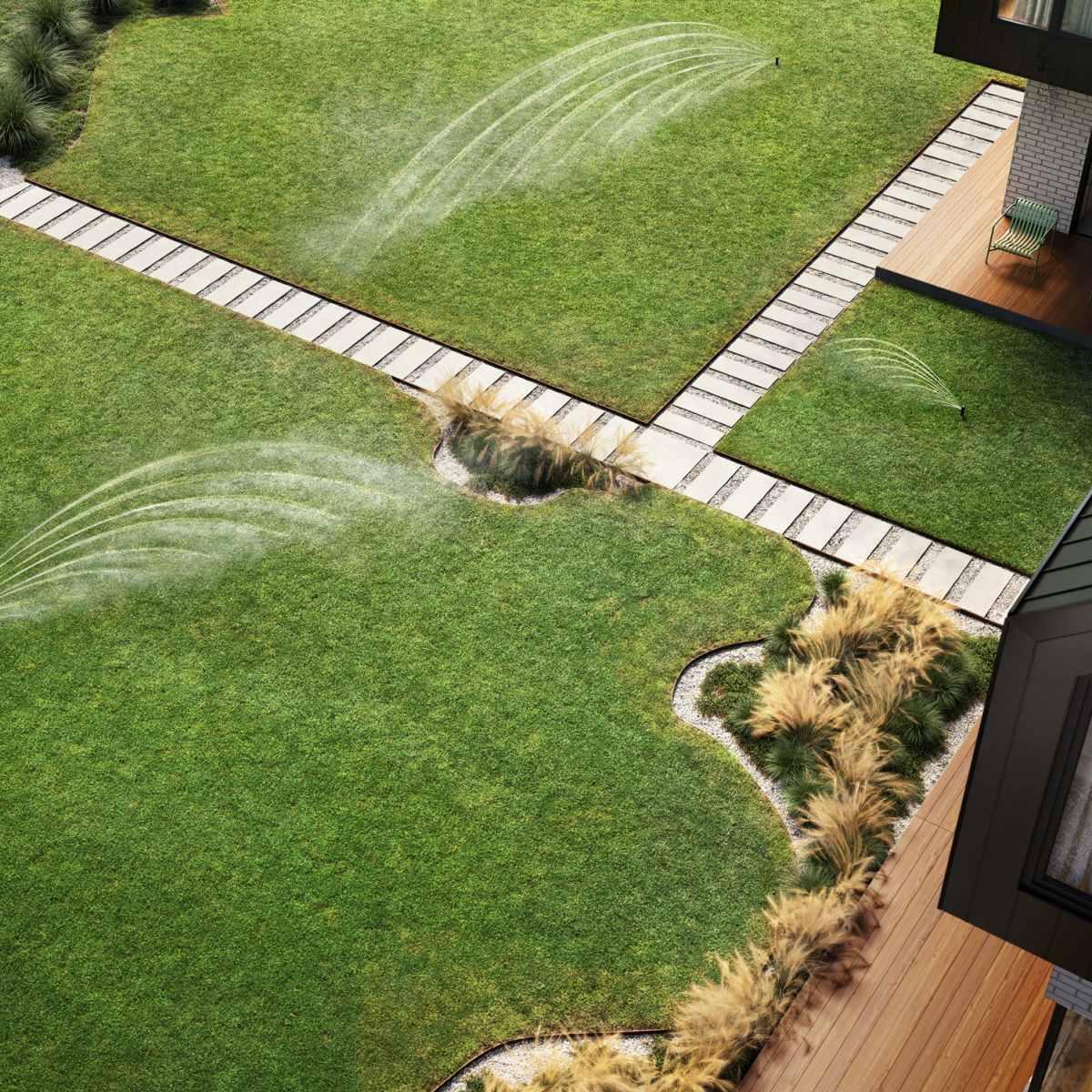
In today’s era of sustainable design, smart irrigation systems stand out as a transformative approach to landscape management. Integrating advanced sensors and automation can significantly enhance water conservation practices, ensuring that your landscape thrives with minimal waste. These systems utilize weather data to adjust watering schedules dynamically, which means your plants receive precisely the moisture they need to flourish. Key features to consider include:
- Soil Moisture Sensors: Detect when the soil is sufficiently hydrated to prevent overwatering.
- Rain Sensors: Automatically shut down the irrigation system during rainfall, conserving water.
- Smart Controllers: Programmed to adjust schedules based on seasonal changes and local weather forecasts.
- Mobile Accessibility: Control your irrigation system remotely for instant adjustments using a smartphone app.
Utilizing these intelligent technologies not only promotes efficiency but also enhances the aesthetic appeal of your green spaces. When plants receive optimal care, their growth and vibrancy are enhanced, contributing to a healthier landscape overall. By employing a sophisticated management system, homeowners and landscape designers can ensure sustainability while saving on water costs. Consider exploring platforms such as irrigation.org for further insights and product recommendations to elevate your landscape project. To visualize the potential savings and environmental impact, check out the following comparison table:
| Conventional Systems | Smart Irrigation Systems |
|---|---|
| Wasted Water: High | Wasted Water: Low |
| Manual Adjustments | Automated, Schedule-Driven |
| Basic Plant Care | Condition-Sensitive and Proactive |
Utilize native plants for sustainable and low-maintenance modern landscape design
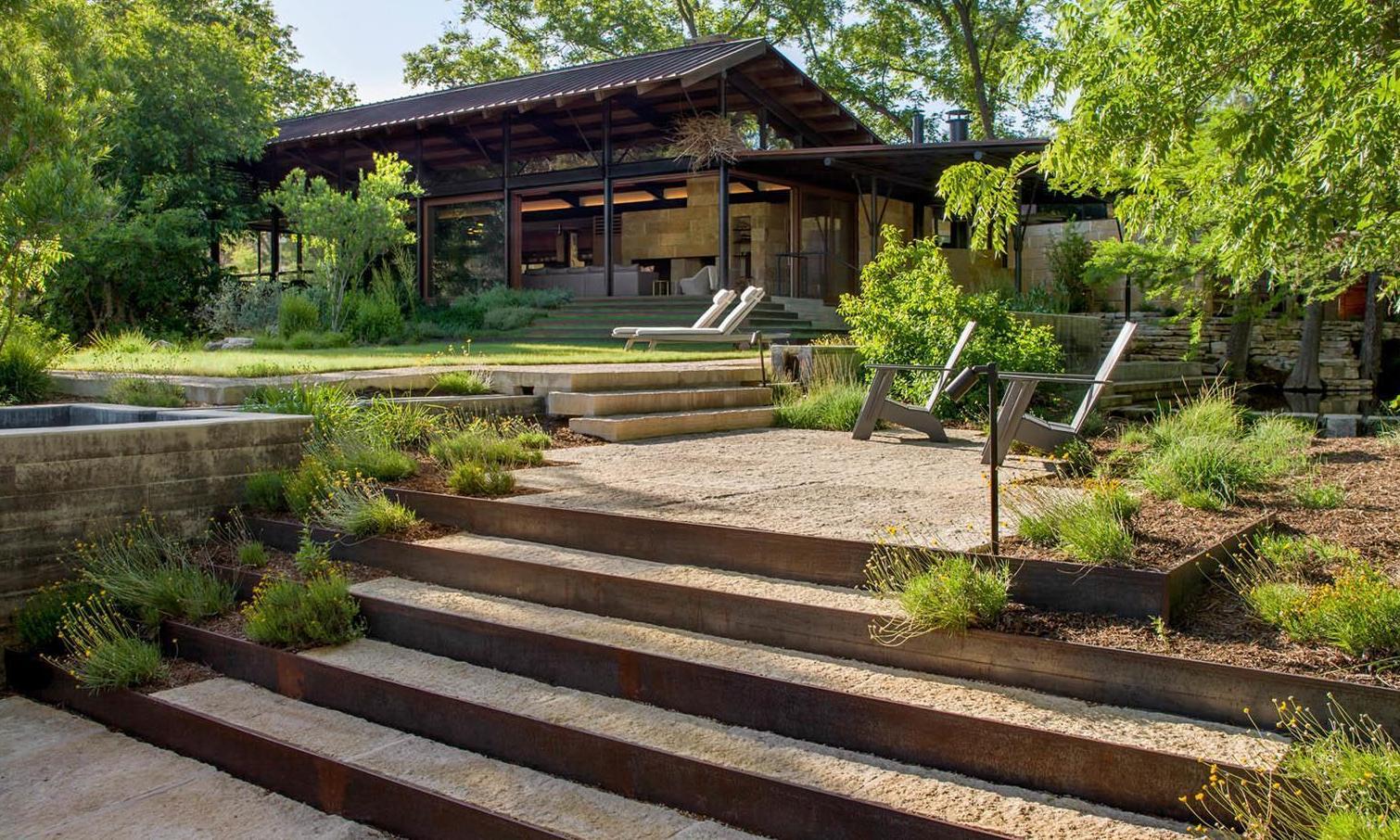
Incorporating native plants into your landscape design not only enhances ecological diversity but also reduces maintenance costs significantly. These plants are naturally adapted to the local climate, soil conditions, and wildlife, making them resilient choices for any outdoor space. Consider creating a visually striking landscape by planting a harmonious mix of perennials, shrubs, and grasses indigenous to your region. This will help create a habitat that attracts beneficial insects, birds, and butterflies, promoting a healthy ecosystem. Moreover, choose plants that provide seasonal interest, such as vibrant blooms in spring and delightful foliage in autumn, to keep your landscape engaging year-round.
To further enhance sustainability, design your garden layout to include elements like rain gardens or bioswales that manage stormwater effectively while showcasing native flora. Use organic mulch to suppress weeds and maintain moisture, minimizing the need for chemical interventions. Group native plants based on their water and sunlight requirements to create micro-climates that facilitate easy maintenance. A well-planned native plant garden can serve as an educational tool as well, allowing homeowners and visitors alike to appreciate the beauty and benefits of local ecosystems. For inspiration on native plant choices, check out the USDA National Arboretum.
Add artistic sculptures that create focal points in modern landscape design
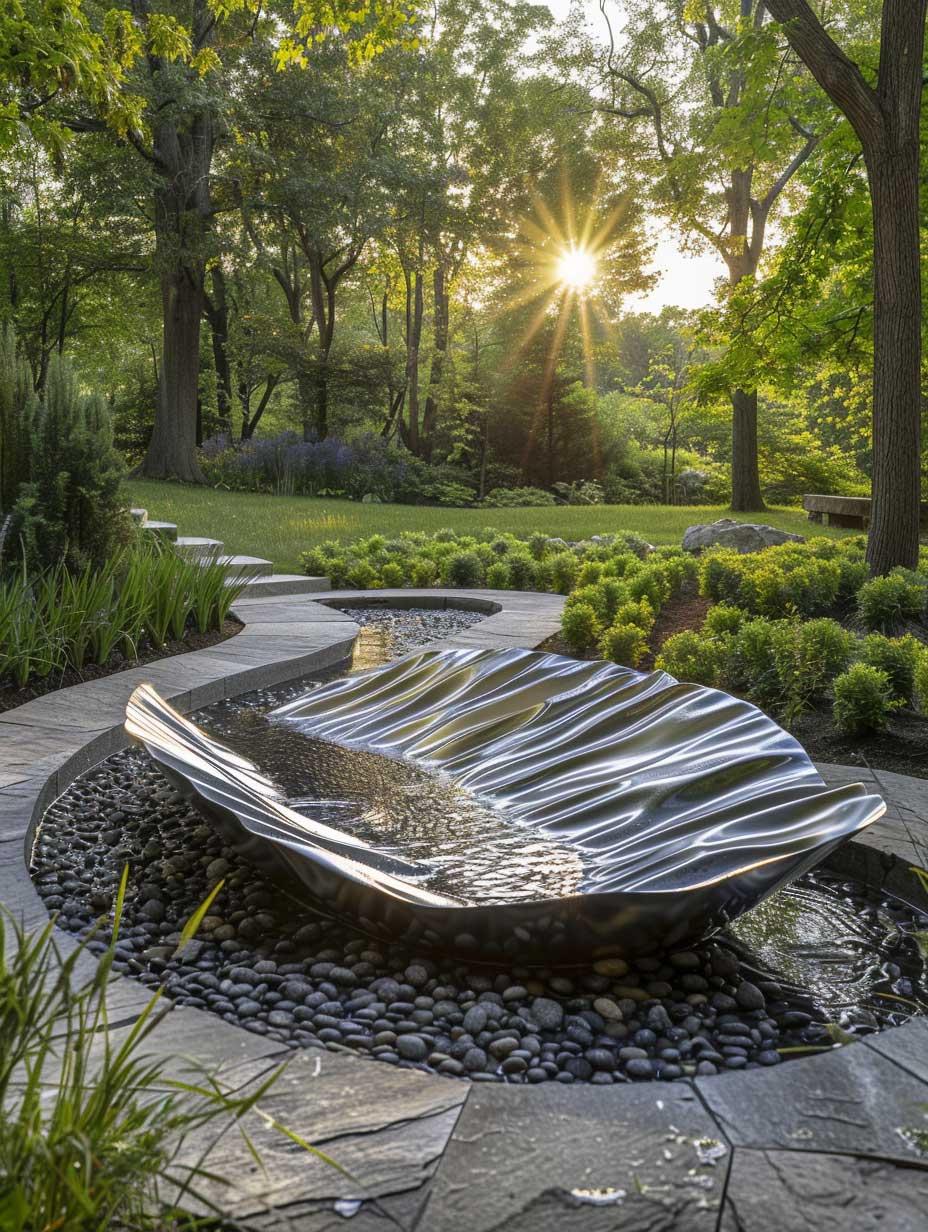
- Abstract Metal Forms: Incorporate large, flowing steel sculptures that echo the undulations of the surrounding topography, creating a striking contrast with the greenery. These sculptures can reflect light beautifully during different times of the day, adding a dynamic aesthetic to your landscape.
- Organic Stone Structures: Embrace natural materials by adding sculpted stone pieces that mimic the forms of natural rock formations. These can serve as both habitats for local wildlife and eye-catching installations, seamlessly blending architecture with nature.
- Interactive Installations: Consider sculptures that invite interaction, such as oversized swings or climbing structures for children. These can engage visitors, encouraging them to appreciate art in a playful and immersive way.
Vibrant glass sculptures create a stunning visual focal point in any garden. From towering pieces that catch the sunlight to small, intricate installations nestled among the flowers, the use of colorful glass can add a sense of whimsy and charm. These artworks can evoke feelings of joy and tranquility, making them perfect for a modern landscape design.
Incorporating water features with artistic flair can elevate the overall aesthetic of your landscape. Sculptures that integrate with fountains or reflecting pools not only serve a functional purpose but also create a serene atmosphere. Consider designs that incorporate flowing water, creating soothing sounds that enhance the sensory experience within your outdoor space. Discover more inspirations at landscapearchitect.com.
Create open-air living spaces to blend indoors with modern landscape design
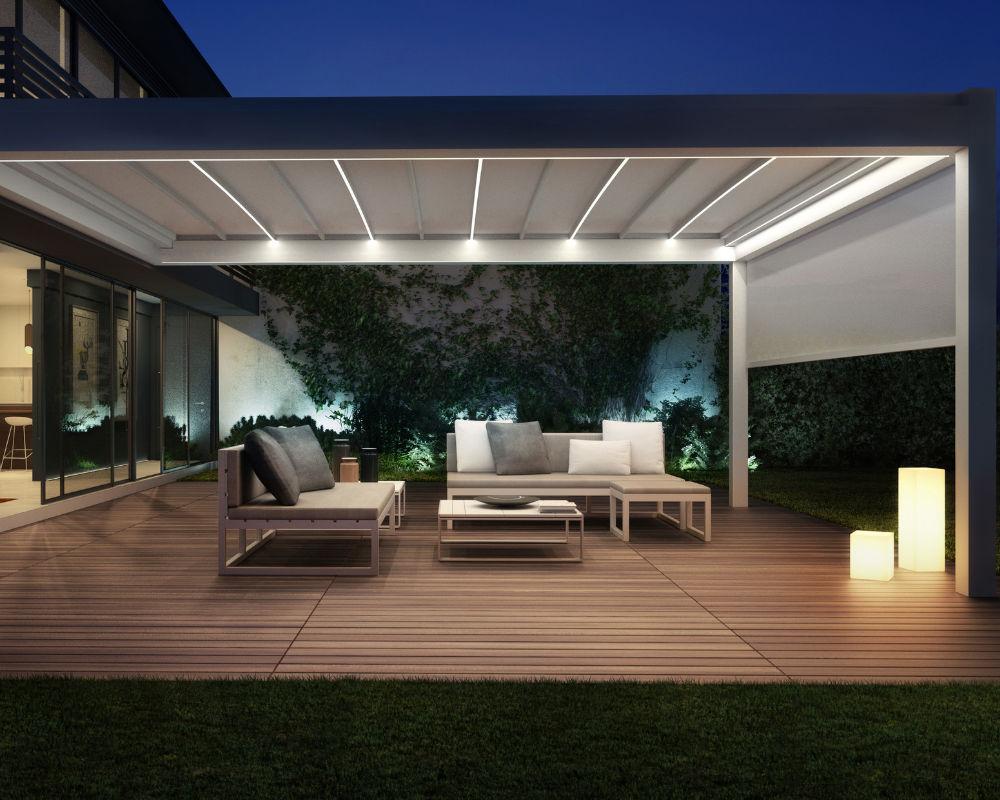
Imagine stepping out of your sleek, modern living room and into an outdoor oasis that seamlessly extends your indoor space. To achieve this stunning blend of environments, consider incorporating floor-to-ceiling glass doors that slide open to reveal a cozy patio or a deck adorned with contemporary furniture. Use various materials like stone, wood, and metal to create distinct zones that echo the design elements of your interior. Think about an outdoor fireplace or a stylish fire pit that serves both function and warmth, inviting you to enjoy those chilly evenings under the stars.
Utilizing semi-permeable materials for your outdoor spaces can create a continuous flow between inside and outside. Consider integrating green walls or vertical gardens that not only enhance air quality but also add depth and texture to your landscape design. A well-placed pergola, draped with climbing plants and soft lighting, can act as a canopy, blurring the lines further while providing shade and coziness. Designing an outdoor kitchen equipped with modern appliances encourages alfresco dining and entertaining, ensuring that your living spaces fully embrace the beauty of nature. For more landscaping inspiration, visit houzz.com.
Use permeable paving to manage water runoff in modern landscape design
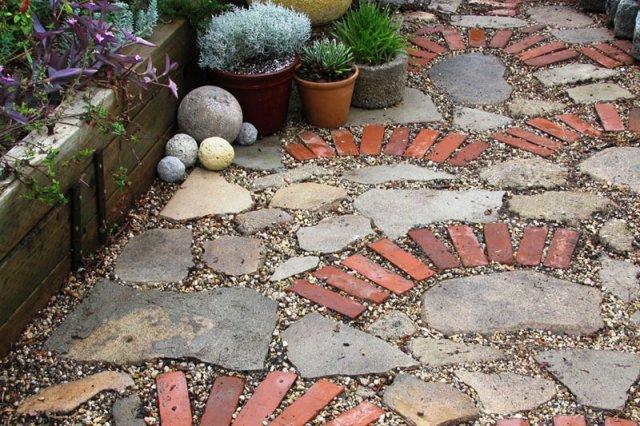
Permeable paving is a game-changer in modern landscape design, providing an eco-friendly solution to manage water runoff while maintaining aesthetic appeal. This innovative approach allows rainwater to seep through the surface, significantly reducing puddles and erosion. Ideal for driveways, walkways, and patios, permeable paving comes in various materials such as gravel, porous asphalt, and permeable concrete, allowing homeowners to choose based on style preferences and functional needs. This approach not only fosters a sustainable environment but also enhances the overall look of outdoor spaces.
Incorporating permeable paving not only benefits water management but also encourages biodiversity in gardens. By integrating rain gardens and native plantings around paved areas, homeowners can create ecosystems that attract local wildlife. Moreover, the design possibilities are endless; mix and match materials to create stunning patterns or textures, or use colorful aggregates to suit your personal style. Explore more on how to implement sustainable landscaping practices at EPA.gov to discover a wealth of resources that support your journey in creating environmentally friendly outdoor spaces.
Integrate fire pits for warmth and gatherings in modern landscape design
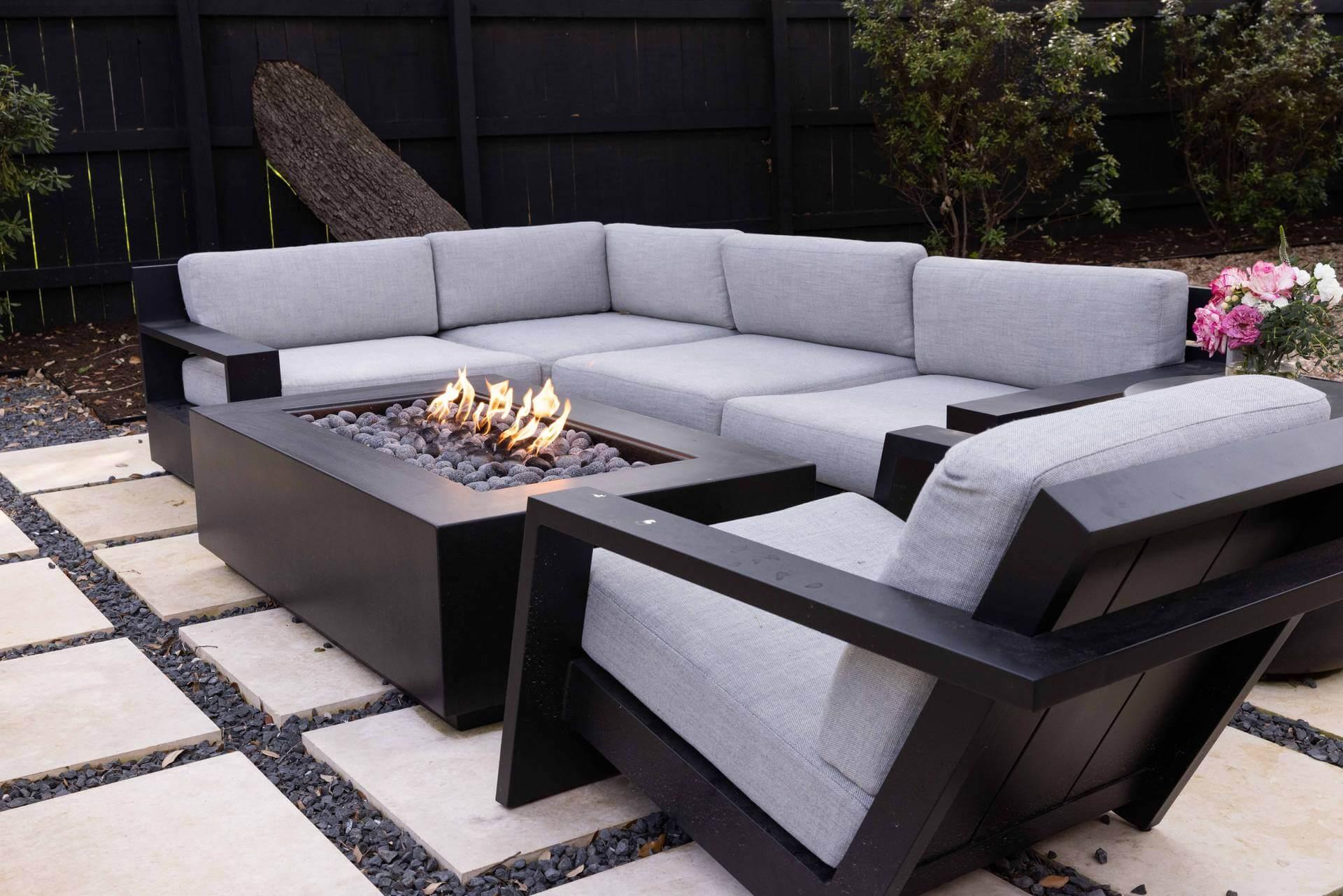
A fire pit serves as a magnificent centerpiece that transforms ordinary outdoor spaces into captivating gathering spots. Whether you’re leaning towards a classic stone structure or a contemporary sleek metal design, the options are endless. Surround your fire pit with comfortable seating, be it chic outdoor sofas or rustic wooden benches, to encourage guests to linger and engage in long conversations. Consider incorporating built-in seating with hidden storage to subtly blend functionality with modern aesthetics. Adding soft lighting, like string lights overhead or integrated LED lights within pathways, can enhance the atmosphere, crafting a warm and inviting ambiance perfect for evenings under the stars.
To amplify the experience, consider designing a multi-functional landscape that seamlessly integrates your fire pit with other outdoor features. Create a modular layout that connects the fire pit to nearby dining or entertainment areas. Using materials that complement pathways, such as gravel, pavers, or wooden decking, can establish a cohesive flow throughout the space. An aesthetically pleasing fire pit table, which doubles as a dining option or coffee table, can be an ideal centerpiece for cocktails or marshmallow roasting. You might also enrich your fire pit area with cozy blankets or patterned throw pillows, making it an irresistible spot for social gatherings.
| Design Element | Functionality |
|---|---|
| Seating Arrangement | Encourages social interaction |
| Integrated Lighting | Enhances evening ambiance |
| Fire Pit Table | Multi-purpose for food/drinks |
| Warm Throws | Adds comfort and style |
For more inspiration on choosing the perfect fire pit for your modern landscape design, check out houzz.com.
Explore geometric patterns in pathways to innovate modern landscape design
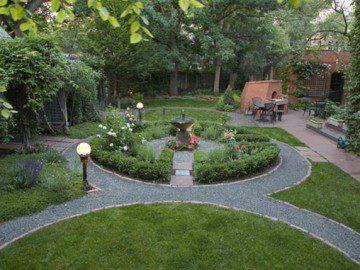
Geometric patterns can serve as a compelling guide to creating visually stunning pathways that blend form and function in modern landscape design. By employing symmetrical arrangements and intricate shapes, you can transform ordinary walkways into artistic expressions. Consider using hexagonal pavers combined with linear gravel borders to create a bold, contemporary look. Alternatively, opt for circular stepping stones surrounded by dense moss or colorful ground cover to establish a striking contrast that invites exploration. Such designs not only captivate the eye but also define the flow of movement through outdoor spaces.
To further enhance the allure of your paths, look to incorporate seasonal elements that change over time. For example, an elegant pathway lined with alternating low-maintenance succulents and vibrant flowering plants can offer both color and texture throughout the year. You can also experiment with lighting techniques by embedding LED lights within the geometric designs, illuminating the shapes at night and creating a magical experience. By playing with these innovative ideas, you can enrich your landscape while leaving a lasting impression on visitors looking to experience nature in a fresh new way.
For additional inspiration on landscape design, check out landscapingnetwork.com.
Blend organic shapes with contemporary materials for unique modern landscape design
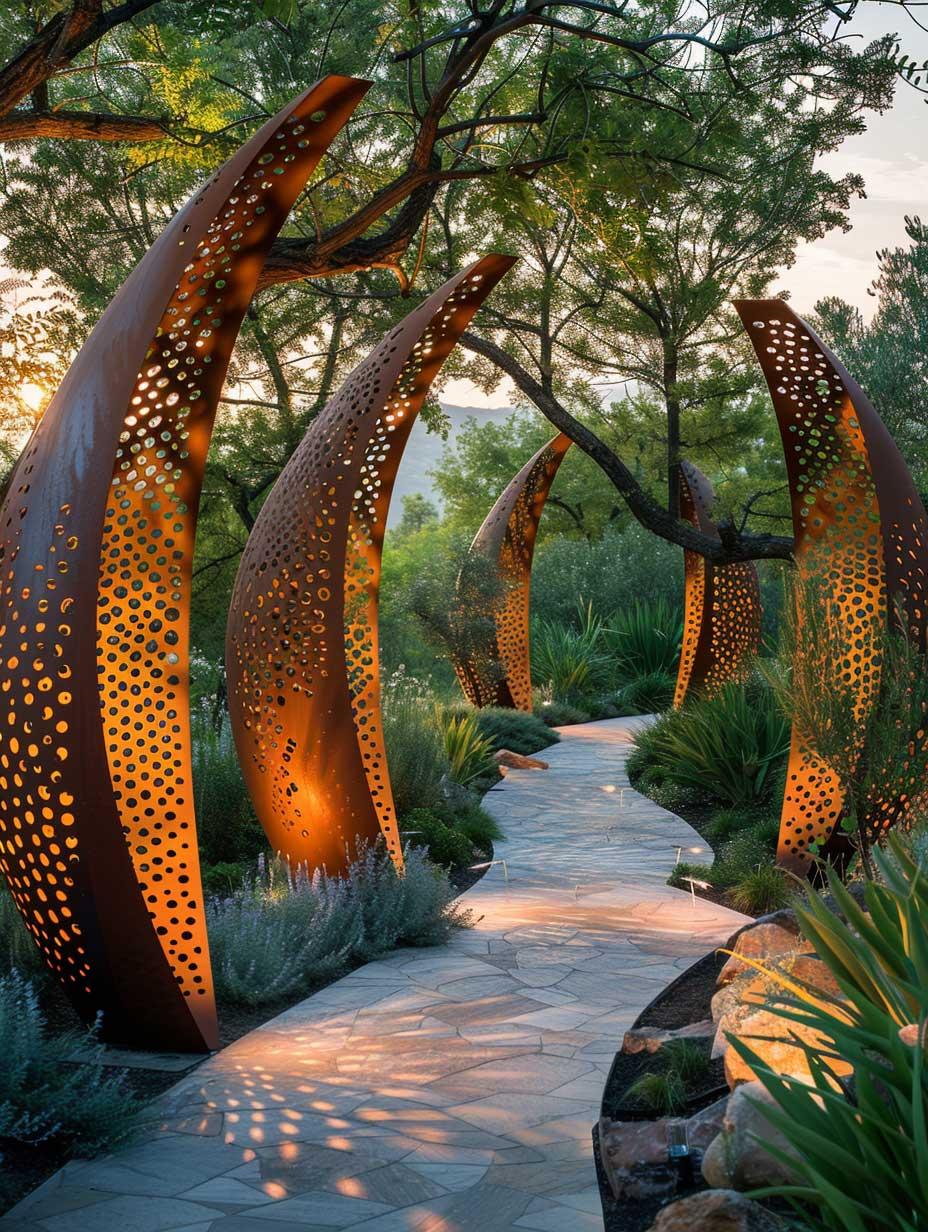
Incorporating organic shapes into modern landscape design opens up a realm of creative possibilities, redefining the use of space in a way that harmonizes with nature while embracing contemporary aesthetics. Curvilinear pathways, made of smooth stones or poured concrete, can guide visitors through a garden that features wave-like flower beds filled with native flora. These designs create a sense of flow and movement, inviting one to explore differing elevations and textures throughout the landscape. Consider using composite decking over irregularly shaped patio areas that echo the gentle curves of the surrounding beds, seamlessly blending natural and engineered materials.
To elevate the design further, installing contemporary garden features such as sculptural water fountains or modern fire pits shaped in asymmetrical forms can act as focal points while complementing the organic layout. Utilize materials like sleek corten steel for raised garden beds or planters, which contrasts beautifully with softer plant forms. Additionally, the integration of glass and metal accents—like railings or decorative garden stakes—can provide a touch of sophistication without detracting from the natural elements. Pairing these modern materials with organic shapes not only enhances the visual appeal but also fosters a serene atmosphere that resonates with the surrounding environment. Explore more on this concept at Gardenista.
Install outdoor lighting that highlights features in modern landscape design at night
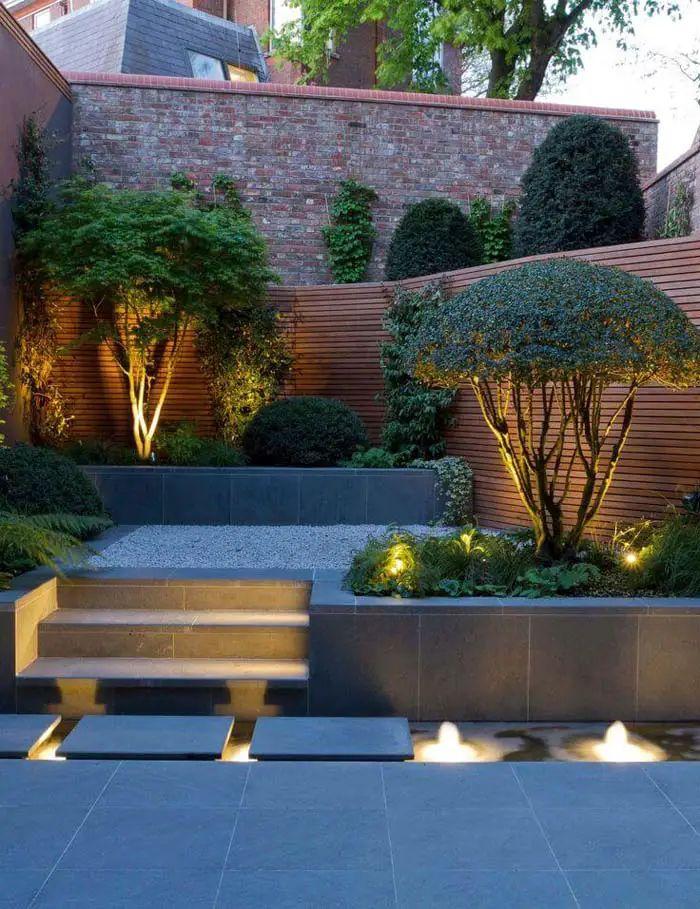
Transform your outdoor space into a mesmerizing evening spectacle by incorporating strategic lighting that accentuates the unique features of your landscape design. Use spotlights to shine brightly on statement trees or architectural elements, drawing attention to their intricate forms. Pathway lights serve a dual purpose: they illuminate your walking paths while guiding visitors through your beautifully designed garden, ensuring both safety and aesthetic appeal. Consider installing wall sconces or LED strip lights on fences and walls to create a cozy ambiance that complements the surrounding flora.
Make use of floodlights to dramatically highlight water features like ponds or fountains, allowing their shimmering surfaces to reflect the light and create a tranquil atmosphere at night. For a softer touch, opt for downlighting from overhead trees to cast gentle shadows on plant beds, revealing the textures and layers of your garden at dusk. To enhance the experience, consider adding smart lighting systems that can be controlled via smartphone apps, enabling you to change colors or intensity based on the mood or occasion. For additional inspiration and ideas, explore Houzz, where you can discover countless landscape lighting designs tailored to modern aesthetics.
Curate seasonal blooms for year-round color in modern landscape design
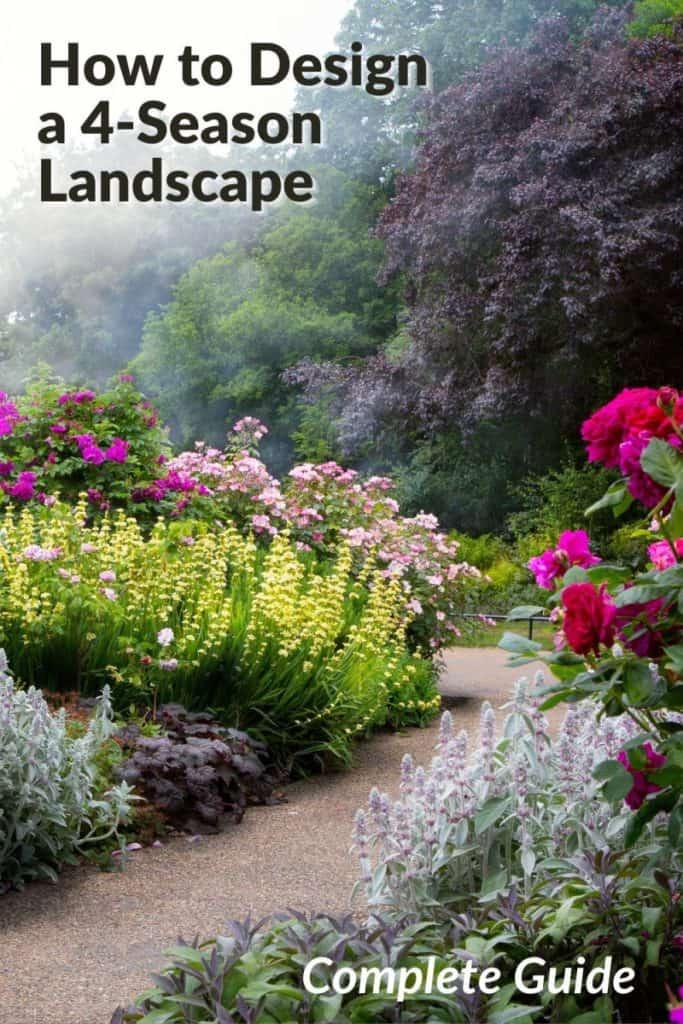
Embrace the dynamic beauty of seasonal blooms to achieve a stunning and ever-evolving landscape. By selecting plants that flourish during different times of the year, you can ensure your garden remains vibrant and visually interesting throughout all seasons. Consider incorporating a combination of perennial and annual flowers along with strategic placement to enhance your outdoor spaces. A few engaging ideas include:
- Spring: Use tulips, daffodils, and hyacinths for bright pops of color, complemented by fresh green foliage from emerging perennials.
- Summer: Transition to bold, sun-loving flowers like coneflowers, daylilies, and zinnias for a lively and lush display.
- Autumn: Opt for warm, earthy tones with asters, chrysanthemums, and ornamental grasses to create a rich tapestry of color.
- Winter: Introduce evergreen shrubs and winter-blooming plants like hellebores or witch hazel to maintain interest during the colder months.
To effectively design your landscape around seasonal blooms, consider creating structured garden beds that highlight specific colors or themes for each season. Layering plants with varying heights can add depth and visual appeal, while incorporating elements like pathways or garden furniture can provide charming focal points. For those looking to boost their gardening knowledge, local extension services often offer expert guidance and resources. Seek inspiration from extension.org and explore plants that thrive in your specific climate zone, ensuring a cohesive and breathtaking landscape all year long.
Design multi-functional spaces that adapt in modern landscape design
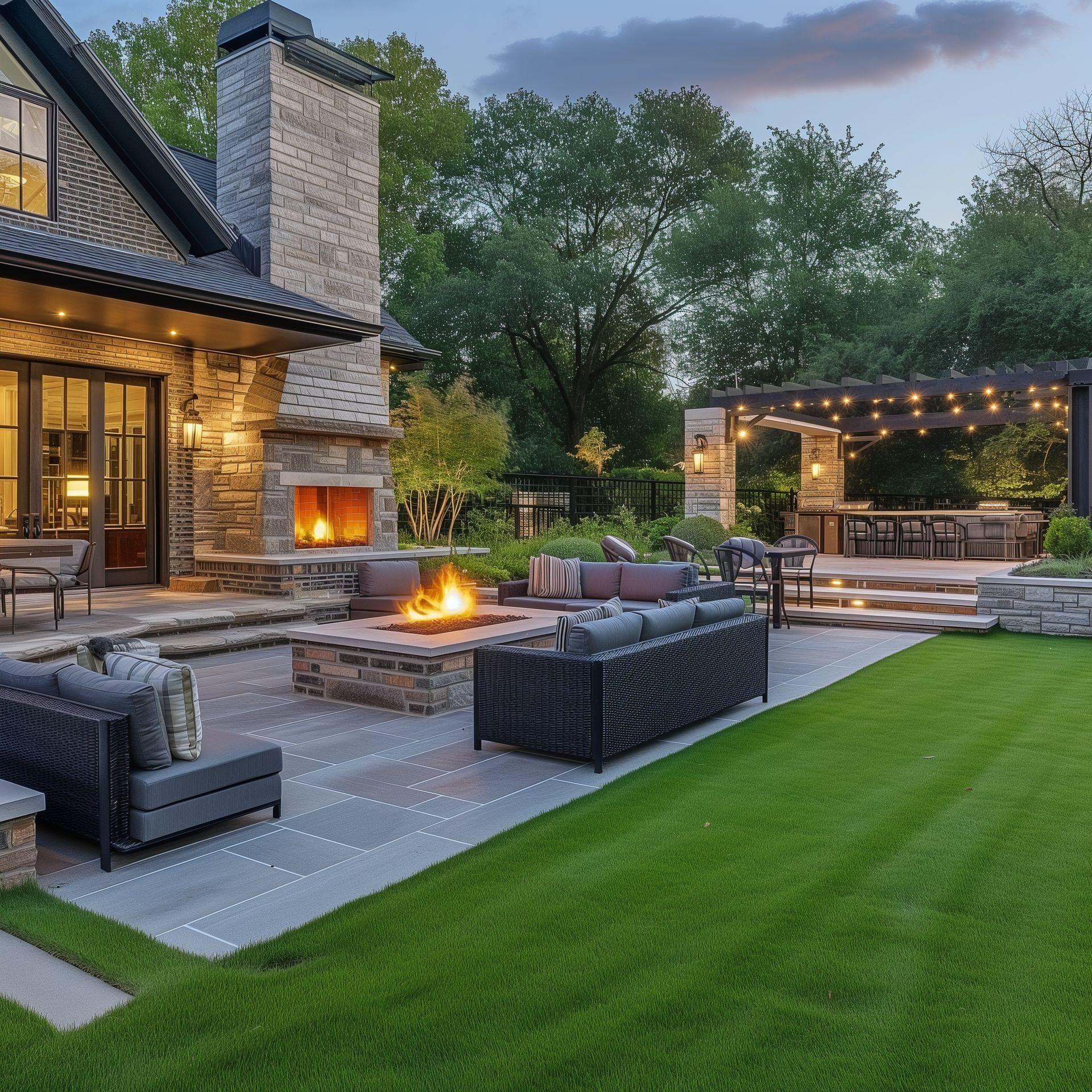
Modern landscape design thrives on creating spaces that are not only aesthetically pleasing but also functional and versatile. By incorporating multi-functional elements, homeowners can maximize their outdoor areas, transforming them into vibrant venues for relaxation, entertainment, and even urban gardening. Consider modular seating arrangements that can be reconfigured for different gatherings or movable raised garden beds that provide fresh produce while doubling as decorative features. Integrating smart technology into outdoor designs can also enhance adaptability; for instance, installing automated lighting or irrigation systems can facilitate effortless transitions between day and night uses.
Effective zoning is crucial for crafting a landscape that serves multiple purposes without compromising on style. Creating distinct areas for different activities—such as a cozy fire pit corner, an area for yoga, and a dining space—can be seamlessly achieved with thoughtful design. Use permeable paving to delineate pathways while allowing for drainage, and incorporate plant borders that naturally define each space. Furthermore, consider including features like a pop-up outdoor screen for movie nights or a hidden storage unit for cushions and gardening tools, ensuring that your outdoor oasis remains clutter-free. Explore further innovative ideas at landscapingnetwork.com.
Incorporate edible gardens for beauty and utility in modern landscape design

Imagine a lush garden bursting with not only color but also flavor! Edible gardens seamlessly blend aesthetics with the utility of cultivating fresh herbs, vegetables, and fruits, enhancing the charm of modern landscapes. These gardens can be designed as focal points, featuring raised beds framed by ornamental plants or strategically placed in corners to create pockets of productivity within busy outdoor spaces. Common options for edible landscaping include:
- Herb spirals: A vertical garden structure that maximizes space and adds texture.
- Vertical gardens: Incorporating wall-mounted planting systems for herbs like basil or chives.
- Fruit trees: Pairing flowering trees with productive varieties like apple or cherry for seasonal beauty.
- Edible landscaping borders: Using edible plants as hedges or borders, including colorful Swiss chard and flowering edible plants.
Beyond just food production, edible gardens contribute to biodiversity and promote sustainability. By choosing companion planting, you can effectively repel pests, thus creating a healthier ecosystem. Including pollinator-friendly plants like lavender alongside fruits or vegetables invites beneficial insects, enhancing the productivity of your garden. Here’s a simple table to illustrate some amazing plant combinations:
| Plant Combination | Benefits |
|---|---|
| Tomatoes & Basil | Enhances flavor and deters pests. |
| Carrots & Onions | Companion plants that repel each other’s pests. |
| Strawberries & Balsam | Balsam helps to deter pests while strawberries thrive. |
Explore more inspiring ideas for integrating edible gardens into landscape design at americangarden.org.
Use mirrors strategically to create the illusion of space in modern landscape design
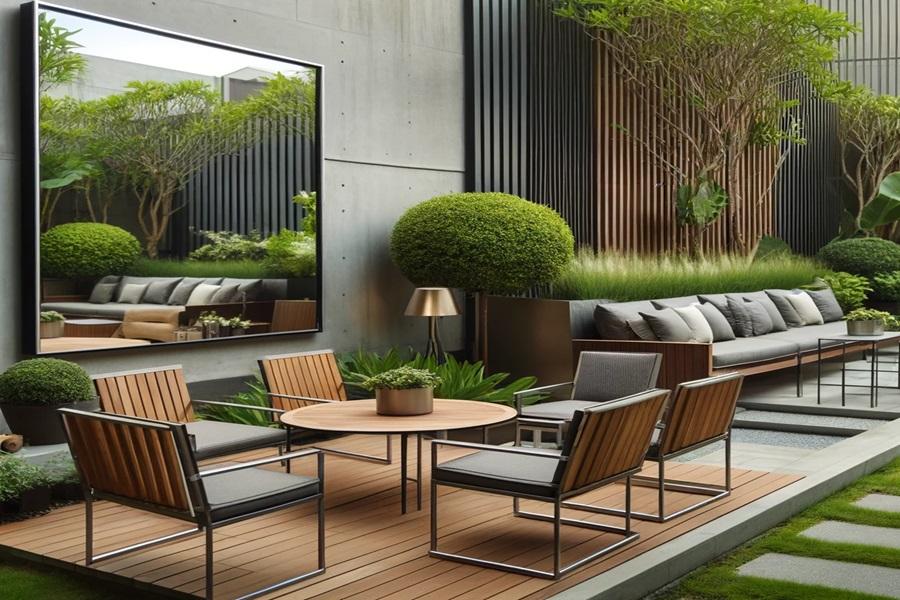
In modern landscape design, mirrors can play a transformative role, enhancing both aesthetics and perception of space. By placing mirrors strategically, you can reflect flowers, trees, and even water features, creating an endless echo of your lush landscape. Try incorporating mirrors into vertical gardens or along pathways to invite light and reflect colors, making the surroundings feel more expansive. For small courtyards or patios, consider using mirrored panels on fence walls. This not only draws the eye outward but also fosters a sense of depth that can dramatically alter how one experiences the environment.
Additionally, the use of framed mirrors as art pieces can contribute to the overall design theme while enhancing spatial perception. Positioning these mirrors to capture the skyline or nearby architectural features can create a stunning focal point that blurs the lines between your landscape and the exterior world. For a more playful twist, incorporate round mirrors nestled among plants or water features; they can mimic bubbles and invite curiosity. Emphasizing the concept of infinity in your landscape can be achieved through these reflective elements, encouraging visitors to explore, bask in the beauty of nature, and enjoy a truly immersive experience. For more inspiration on using reflective surfaces in garden design, check out landscaping.network.
Create quiet retreats with water features in modern landscape design
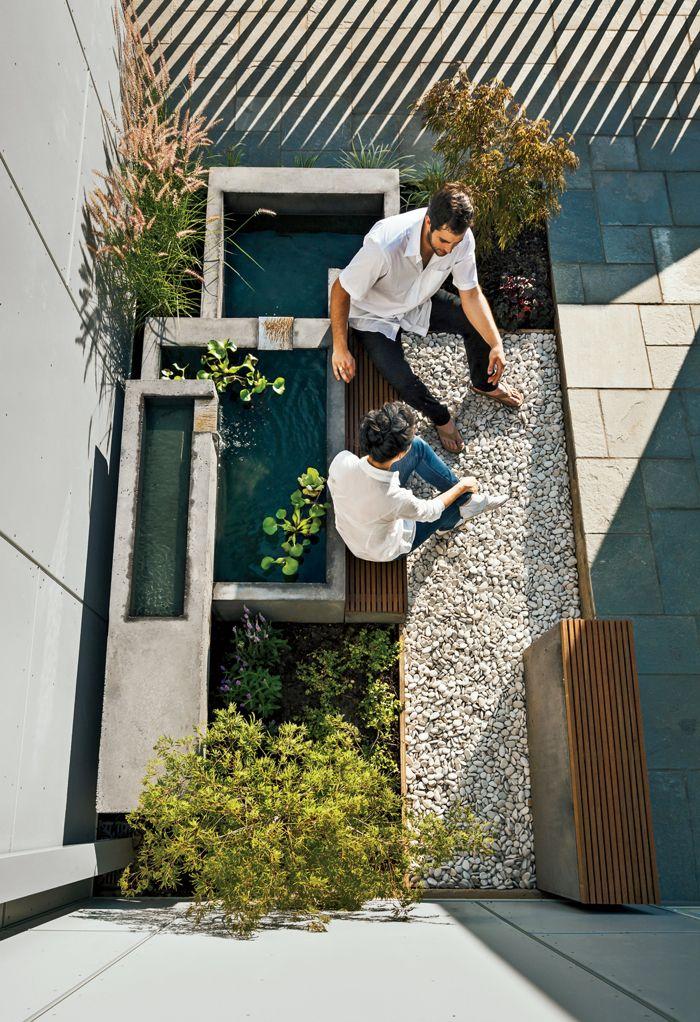
Create a serene environment in your outdoor space by incorporating water features that blend harmoniously with modern design. Water elements like ponds, fountains, and streams not only serve as focal points but also create a calming soundscape, promoting relaxation. Consider installing reflecting pools that mirror the surroundings, allowing them to become immersive experiences within the landscape. Add native plants around the water to enhance biodiversity while maintaining a contemporary feel.
Incorporate minimalist water installations such as wall fountains or sleek basins that can serve as both art pieces and functional elements. Koi ponds can also add a touch of elegance, encouraging interaction through feeding while attracting wildlife. To further emphasize tranquility, you might opt for a bubbling rock feature that gently dispenses water, providing a soothing auditory backdrop. When designing your landscape, remember to utilize lighting to illuminate these features at night, creating stunning reflections and an enchanting atmosphere. For more inspirations on integrating water elements into your landscape, visit House Beautiful.
Experiment with color schemes to evoke emotions in modern landscape design
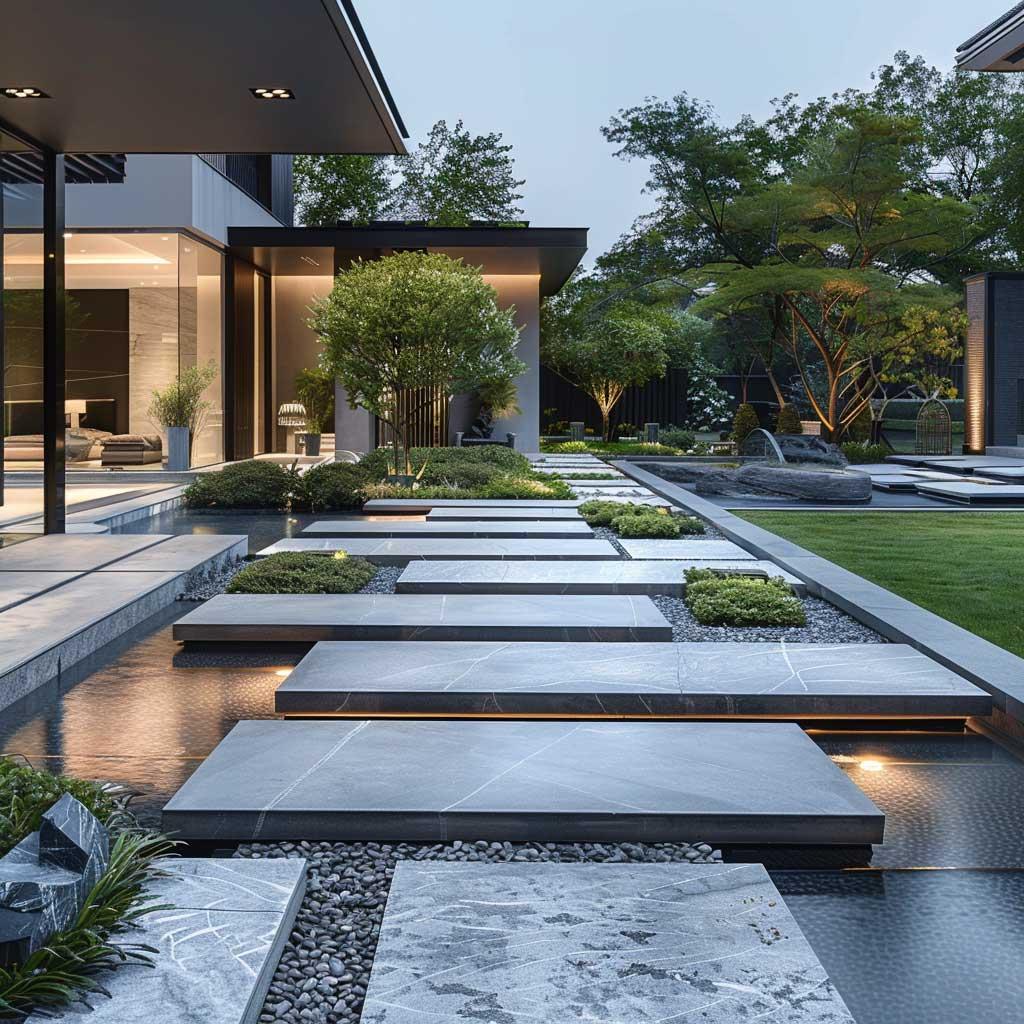
When it comes to landscape design, the colors you choose can significantly influence the mood and atmosphere of the space. To harness the power of color, consider utilizing complementary hues that create a vibrant contrast, drawing the eye and evoking a sense of energy. For instance, pairing deep blues with bright oranges can make a garden feel lively and cheerful. On the other hand, using monochromatic shades can create a calming, cohesive look. Imagine a serene landscape with varying tones of green and subtle floral accents, perfect for fostering tranquility and relaxation.
Another intriguing approach is to blend earthy palettes with bold accents to stimulate creativity and add interest. For example, a base of muted browns and greens can be elevated by adding splashes of bright red or sunny yellow, enhancing visual appeal and encouraging engagement with the space. Additionally, consider the emotions tied to various colors: cool colors like blues and purples can promote serenity and calm, while warm colors like yellows and reds can inspire excitement and warmth. Incorporating these principles into your modern landscape design can effectively transform your outdoor environment into a space that resonates with a desired emotional quality. For further inspiration on color psychology in design, visit The Balance.
Use recycled materials creatively to promote sustainability in modern landscape design
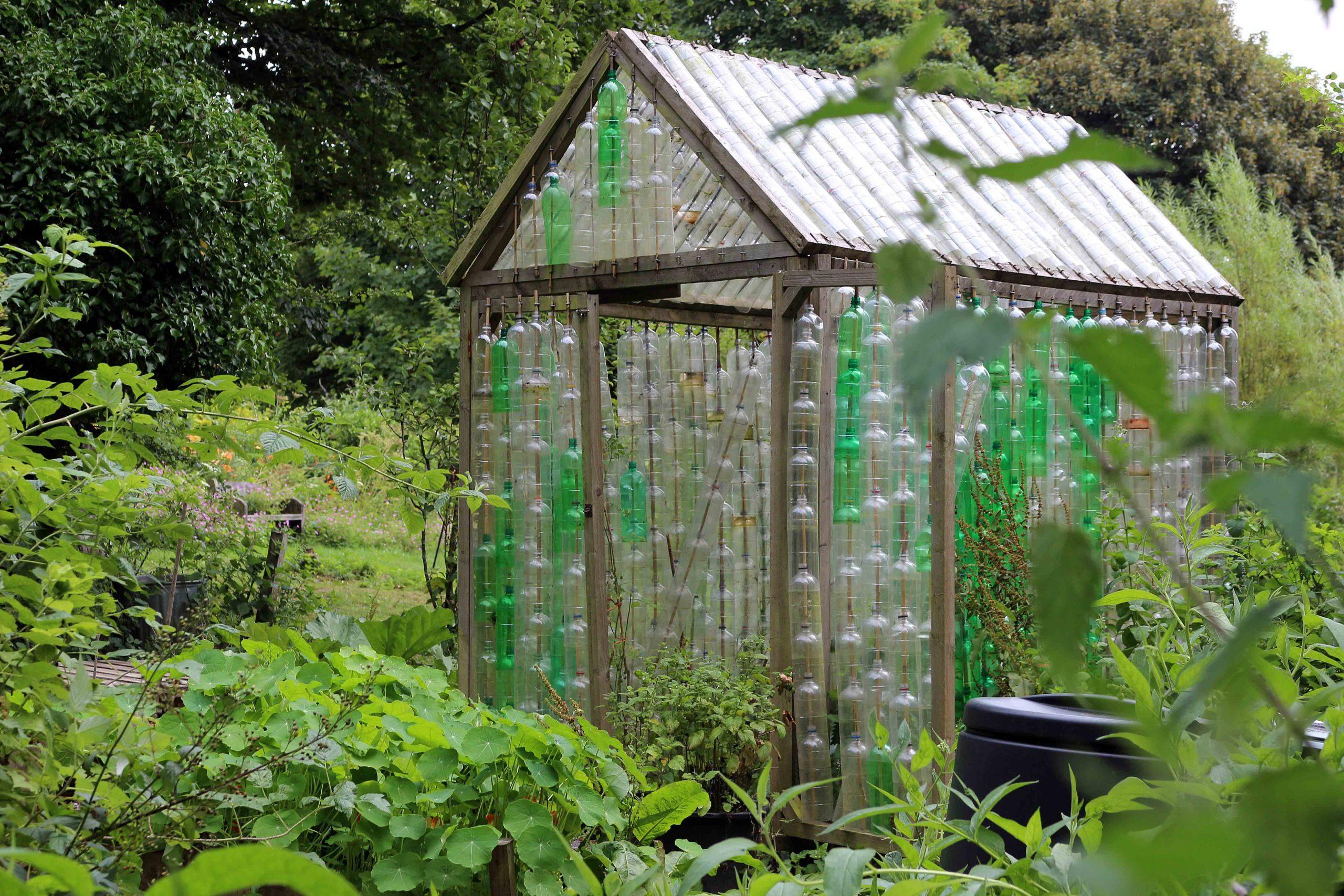
- Glass Bottle Borders: Use colorful glass bottles to create whimsical garden borders or pathways. Their unique shapes and hues add a playful touch while promoting recycling.
- Wood Pallet Furniture: Transform old wooden pallets into furniture like benches, tables, or garden planters. They offer a rustic aesthetic, blending functionality with environmental consciousness.
- Reclaimed Tire Planters: Old tires can be creatively repurposed as planters. Paint them in bright colors to add vibrancy to your garden, while providing a durable container for your plants.
- Brick and Stone Pavers: Salvaged bricks and stones can be rearranged to create stunning patios or walkways. This minimalist look ensures that sustainability remains stylish.
Space-saving and eco-friendly
| Recycled Material | Creative Use | Benefits |
|---|---|---|
| Plastic Bottles | Vertical Garden Walls | |
| Old Furniture | Garden Seating | Unique style and budget-friendly |
| Cinder Blocks | Planter Boxes | Versatile and durable |
Discover how these innovative ideas can reduce waste and enhance your outdoor spaces by exploring resources like Earth911, which offers further insights into sustainable practices.
Incorporate tech-driven elements like app-controlled lighting in modern landscape design
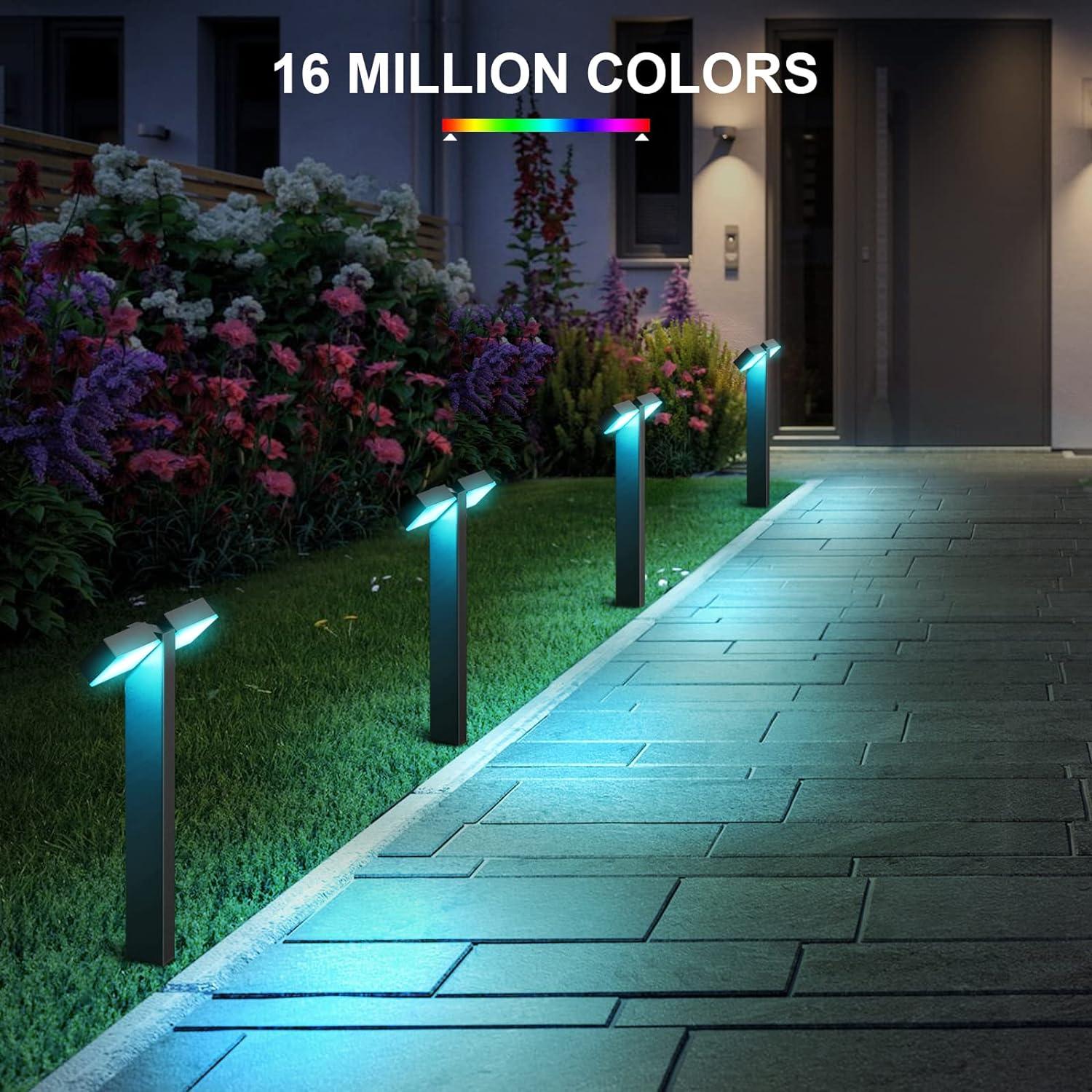
Integrating technology into landscape design elevates outdoor spaces by offering convenience, ambiance, and customization. One of the most captivating tech-driven features is app-controlled lighting, which allows you to adjust the brightness and color of lights to create various moods for gatherings or peaceful evenings. With the tap of a button, homeowners can transform their garden from a vibrant party space to a soothing sanctuary. Imagine a scenario where your patio lights gradually change from warm yellow to soft blue as the sun sets, inviting a sense of calm and relaxation.
Additionally, consider the versatility of programmable lighting systems that can sync with music or respond to environmental changes. These systems can automatically illuminate pathways as dusk falls or highlight specific features like water fountains or sculptures, ensuring your landscape looks stunning at all times. Features such as motion sensors can enhance safety while providing a welcoming atmosphere when guests arrive. Integrating such technology not only modernizes the aesthetic but also creates a seamless blend between nature and innovation to enhance outdoor living. For further inspiration, check out landscapingnetwork.com.
Design space for wildlife habitats to enhance biodiversity in modern landscape design
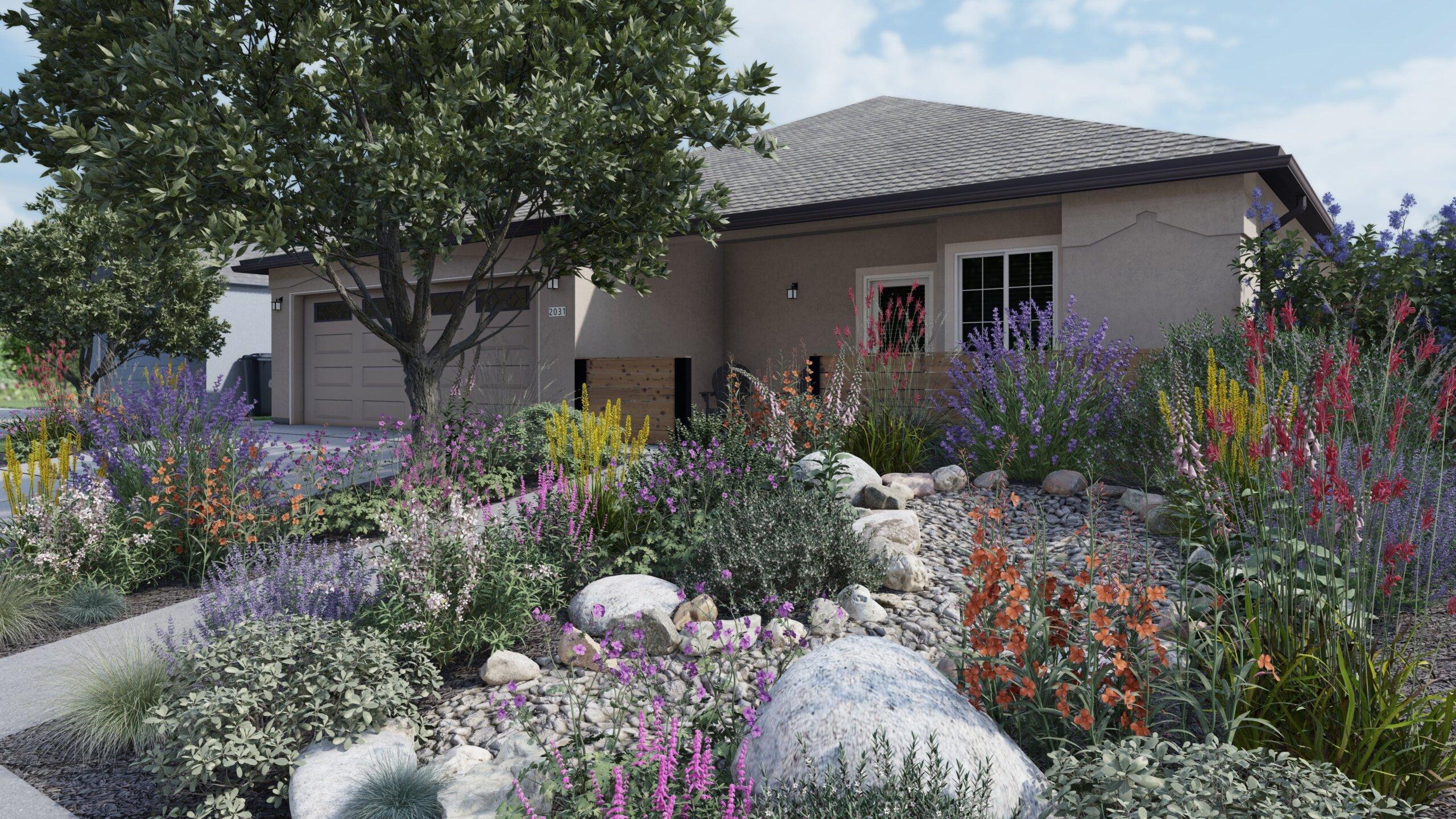
| Feature | Benefit |
|---|---|
| Native Plant Gardens | Attract local pollinators and enhance ecological balance. |
| Rain Gardens | Manage stormwater runoff while providing habitat for amphibians. |
| Living Green Roofs | Create additional habitat space while insulating buildings. |
| Wildlife Corridors | Facilitate safe animal movement between fragmented habitats. |
| Vegetated Walls | Add aesthetic value and improve air quality. |
Incorporating diverse wildlife habitats into your landscape design can create a thriving ecosystem and an innovative aesthetic. Emphasizing native plant gardens is essential, as these plants require less maintenance and resources, plus they attract native pollinators like butterflies and bees. Meanwhile, rain gardens can play a critical role in stormwater management by absorbing runoff, and they double as essential breeding grounds for amphibians. These features not only enhance your garden’s beauty but also signify a commitment to sustainability and ecological responsibility.
Engaging in strategies like living green roofs and wildlife corridors can significantly broaden the impact of your design. Green roofs provide insulation while allowing for rooftop gardens that support birds and beneficial insects. Wildlife corridors, on the other hand, offer safe passages for animals navigating urban landscapes with fragmented habitats. By incorporating elements like vegetated walls, you not only invigorate your design with lush foliage but also contribute positively towards air quality and temperature regulation. Explore more ideas at themonumentalgroup.com.
Utilize minimalist aesthetics for clean lines in modern landscape design
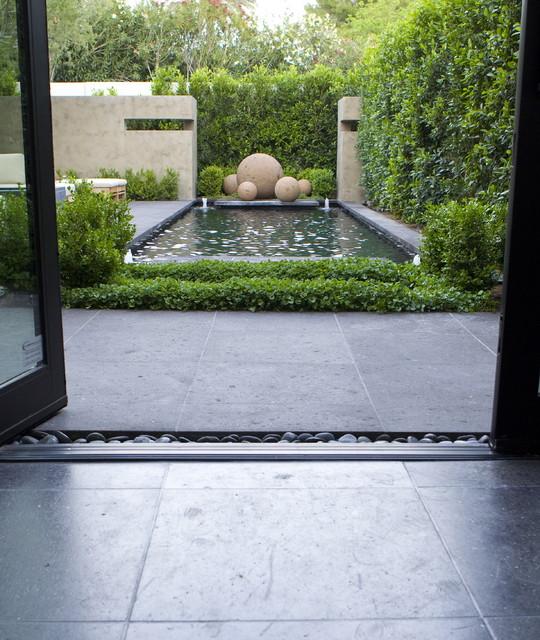
Embracing minimalist aesthetics in landscape design allows for the creation of spaces that highlight the beauty of simplicity. By incorporating clean lines and geometric shapes, landscapes transform into serene environments that promote relaxation and clarity. Consider the use of bamboo screening or cedar fences to define areas without overwhelming the senses, providing a seamless flow between different sections of your garden. Add monochromatic plant selections to enhance the sleekness; plants with bold, structural forms, like ornamental grasses and sculptural succulents, create visually striking points of interest without clutter.
Incorporating elements such as decomposed granite pathways or concrete pavers allows for seamless transitions and enhances the clean lines of your outdoor space. To add depth while maintaining a minimalistic approach, raised garden beds made from corten steel or natural stone can act as focal points while contrasting beautifully with the soft textures of surrounding greenery. Utilize minimal lighting, such as recessed ground fixtures, to accentuate pathways and drawing attention to key features. For more inspiration on minimalist design elements, visit archdaily.com for innovative ideas that prioritize simplicity and sophistication in your landscape projects.
Add shade structures to improve comfort in modern landscape design
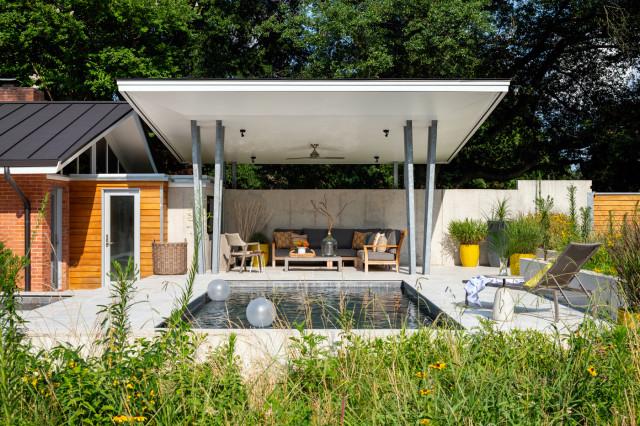
Integrating shade structures into your outdoor spaces can dramatically enhance the overall comfort and functionality of modern landscapes. These structures not only provide respite from harsh sunlight but also serve as aesthetic focal points that can elevate the design of your garden or patio. Consider installing pergolas adorned with vibrant climbing plants, or sleek, modern awnings that complement your architecture. Each structure can be adapted to fit various styles, from rustic wooden frames to contemporary metal designs, allowing you to create a cohesive look that reflects your personal taste.
There are many creative ideas for shade structures that can resonate with your landscape vision. Think about retractable awnings that can extend or retract based on the weather, providing flexibility throughout the seasons. You could also explore fabric canopies strung between trees or posts, which can add an element of playfulness and shelter. For those seeking a more permanent solution, consider building a gazebo or a shaded lounge area equipped with comfortable seating and lighting, setting the stage for intimate gatherings under the stars. For inspiration on different shade solutions, visit landscape.io.
Integrate outdoor kitchens for entertainment in modern landscape design
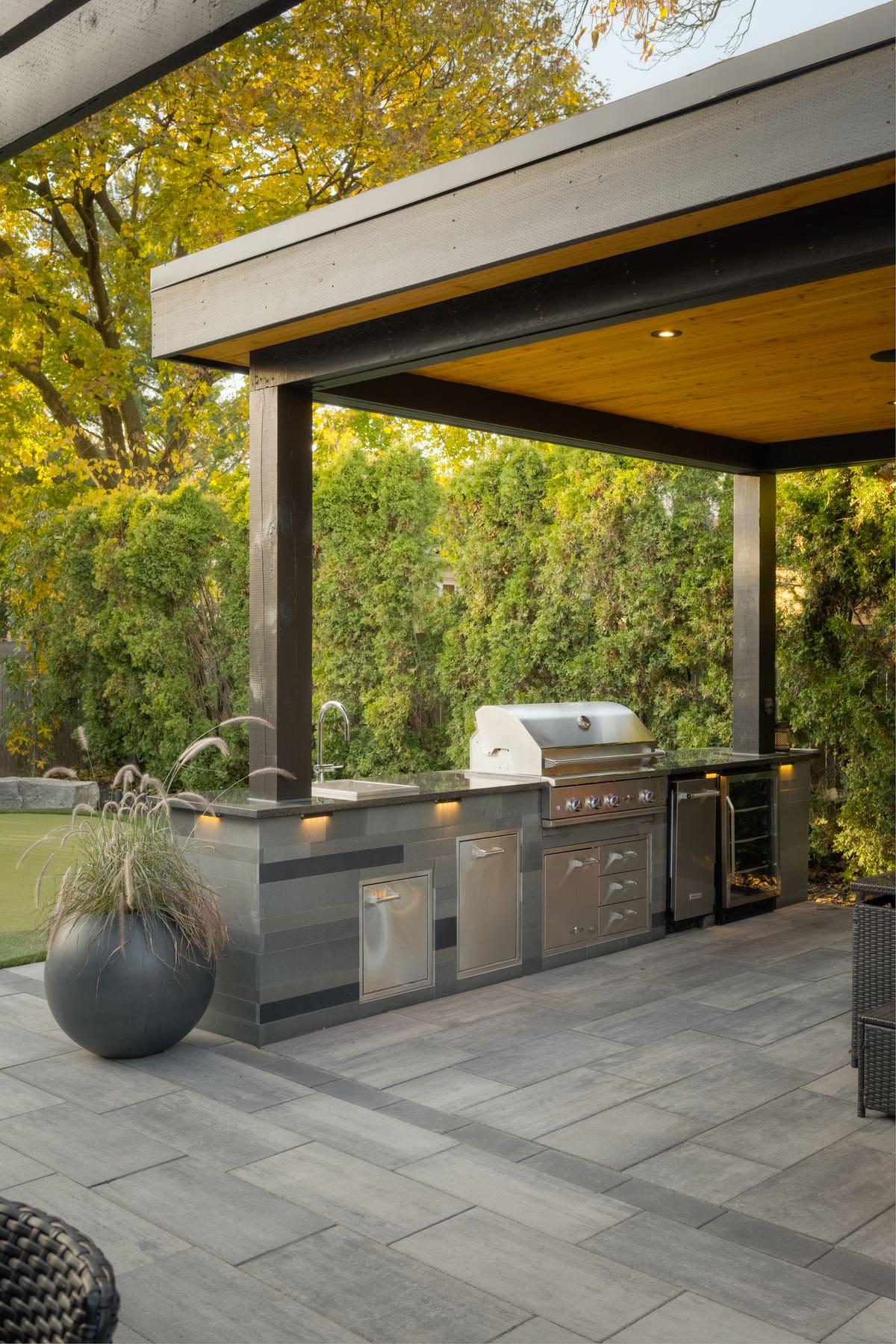
To take your outdoor kitchen to the next level, consider incorporating seating arrangements that flow seamlessly with the landscape design. Options like contemporary bar stools or an integrated bench can create an inviting atmosphere. You can make it even cozier with outdoor cushions and throws that introduce color and comfort. Furthermore, integrating smart technology, such as outdoor refrigerators, lighting controls, and music systems, can elevate the experience—from easy food storage to enhancing the overall ambiance. For more inspiration on outdoor kitchen designs, check out Houzz, where a wealth of innovative ideas awaits.
Explore layered plantings for depth and texture in modern landscape design
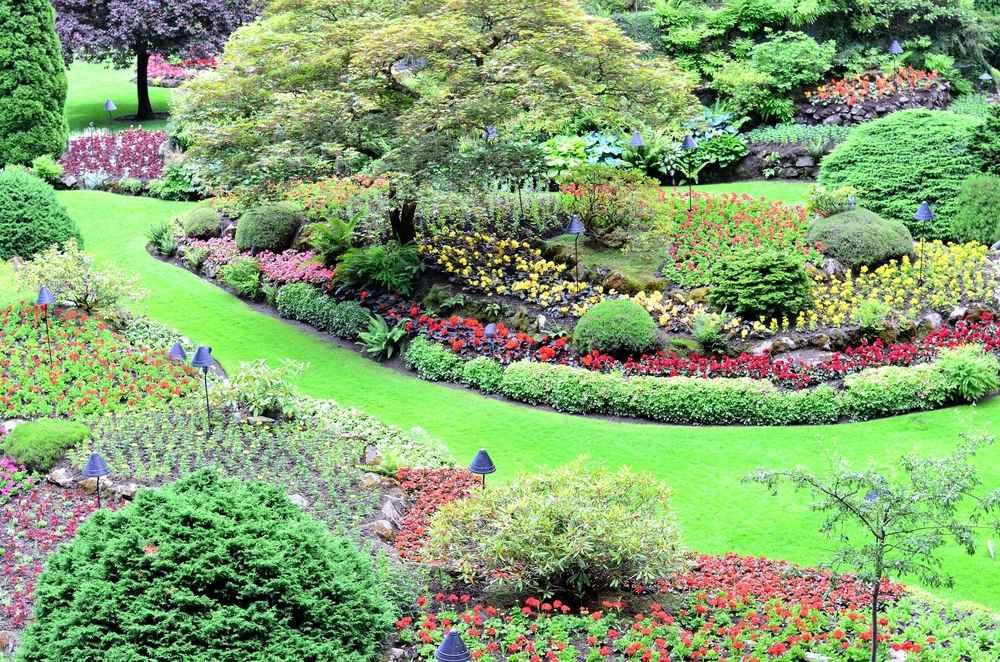
In modern landscape design, incorporating layered plantings can elevate the aesthetic of any outdoor space, creating not just beauty but also an intriguing . By strategically selecting plants of varying heights, textures, and colors, you can craft a more dynamic and visually engaging environment. Consider creating a tiered effect through the use of vertical elements such as ornamental grasses, flowering perennials, and low-growing ground covers that can interlace harmoniously. This not only maximizes visual interest but also enhances the ecological value of your landscape, attracting pollinators and supporting local wildlife.
To execute layered plantings effectively, it’s essential to plan your layout wisely. Here are some elements to consider when designing your plant layers:
- Focal Points: Use taller plants, like Sunflowers or Hollyhocks, as striking focal points.
- Texture Variation: Mix leaf textures, such as the coarse foliage of Elephant Ear with the fine leaves of Blue Fescue.
- Seasonal Interest: Select plants that bloom at different times to ensure year-round charm.
- Color Harmony: Choose a color palette that complements your home’s architecture and existing outdoor features.
| Plant Type | Height | Season of Interest |
|---|---|---|
| Sunflowers | 5-10 ft | Summer |
| Elephant Ear | 3-5 ft | Summer |
| Blue Fescue | 1-2 ft | Year-round |
| Hollyhocks | 4-8 ft | Summer |
This method not only defines your landscape’s character but allows for creative expression rooted in sustainable practices. For more innovative landscape design ideas, you can explore resources like Gardenista for inspiration and tips.
Create paths that encourage exploration and adventure in modern landscape design
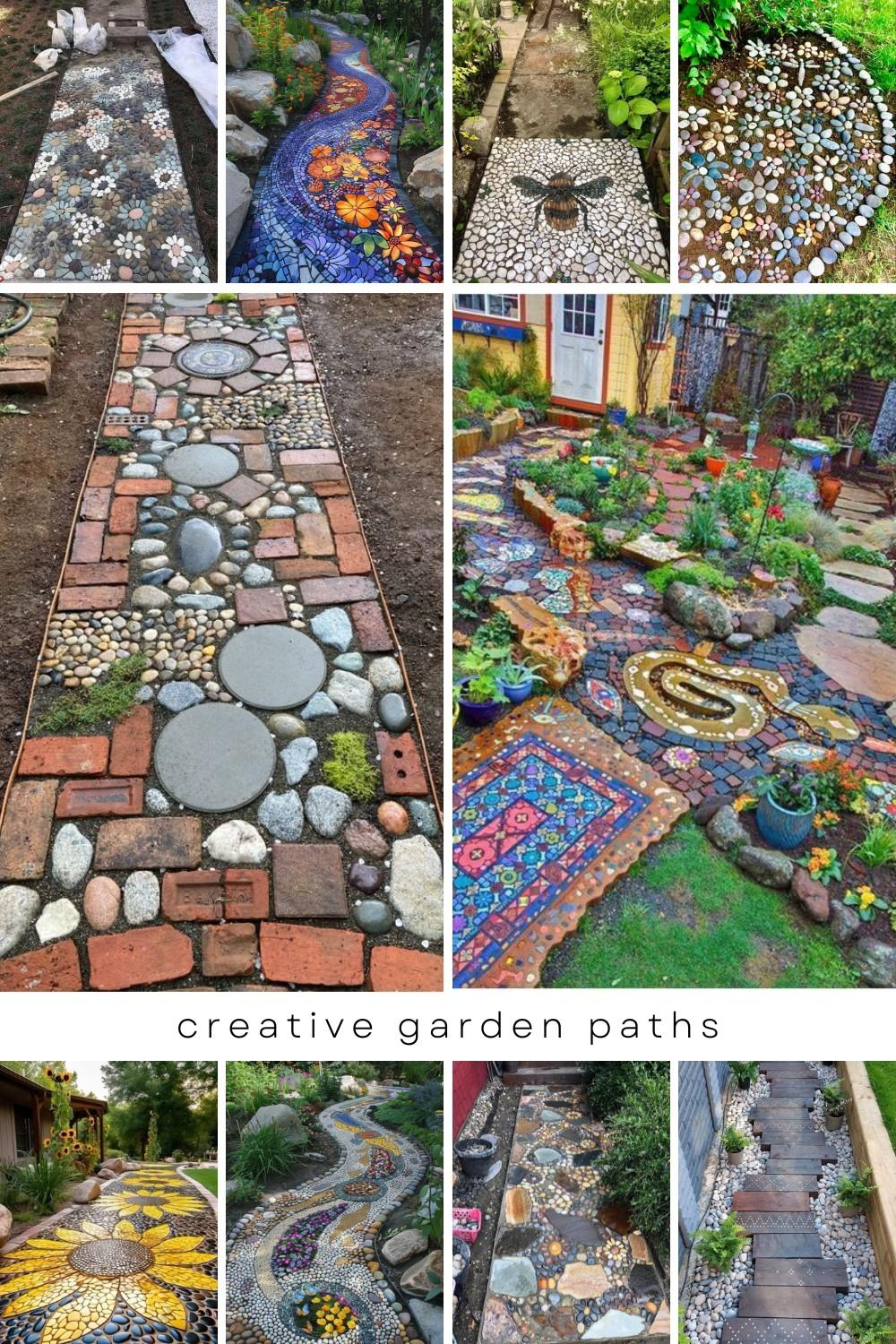
Designing landscapes that inspire curiosity is all about creating pathways that lead to unexpected discoveries. Curvilinear paths, which twist and turn rather than follow a straight line, evoke a sense of mystery and invite exploration. These winding routes can be bordered by a variety of flora, offering visual interest and a dynamic transition through the garden. Incorporating stepping stones of varying widths and materials can further enhance the tactile experience, encouraging visitors to meander and interact with their surroundings. Consider planting fragrant herbs or flowering plants along these paths, allowing guests to engage their senses as they stroll through the landscape.
To elevate your outdoor space, integrate interactive elements that spark adventure. For instance, a secret garden nook hidden behind tall hedges or a trellis adorned with climbing vines can serve as a delightful surprise for visitors. These sheltered areas can include comfortable seating and playful garden decor to encourage lingering. Adding a suspended walk or bridge over a small pond or landscaped area can provide a unique perspective of the landscape while enhancing the sense of exploration. Utilizing varied textures and materials can create visual contrasts, further guiding guests through the landscape and ensuring every corner offers a new experience. For more innovative landscape design ideas, check out Houzz.
To Conclude
As we wrap up our exploration of “,” we hope you’ve uncovered a wealth of creative concepts to invigorate your outdoor spaces. Whether you’re transforming a cozy garden nook or reimagining a sprawling backyard, innovation lies in the details that reflect your unique style and environment.
Nature provides the canvas, and with the right ideas, you can paint a picture that resonates with both tranquility and vibrancy. Remember, the best landscapes are those that marry functionality with beauty, creating an oasis that invites you to linger and enjoy.
So, why not take these inspirations and let your imagination run wild? The potential for creating stunning outdoor environments is limitless, and we can’t wait to see how you make these ideas your own. Here’s to cultivating spaces that inspire and rejuvenate—happy designing!
